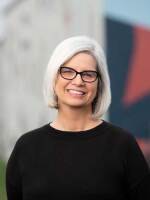Two women from Burundi, now living in Maine, have asked to join a lawsuit against the Department of Health Human Services. DHHS recently announced that it would no longer reimburse communities that provide General Assistance to asylum seekers and other immigrants. Since then, the Maine Municipal Association and the cities of Portland and Westbrook have filed suit against the Department.
Now the ACLU of Maine and the group Maine Equal Justice Partners have brought a complaint on behalf of the two women, who are both here legally but have not been granted work permits. Tonight, in the second of two reports, Susan Sharon looks at how GA has helped stabilize their lives.
One of the women, Suavis Furaha, says she was forced to flee Burundi with her four children because their lives were in danger. She declined to elaborate: Her husband is still there, she says, and she's worried that what she says could jeopardize his safety.
With no other options, Furaha says she got a visa, quickly packed up the kids with a few clothes and arrived in Maine last fall speaking no English, with no money and no place to go.
"We come here to Maine because of their system of General Assistance," she says, "because we can't go anywhere else without any money, without anything, without help."
Maine is one of just a handful of states that provides GA to asylum seekers and other immigrants. Gov. Paul LePage says that makes Maine an outlier at a time when resources are scarce. But advocates say the temporary assistance is a good investment in families who will eventually become productive, tax-paying citizens, and they think it's the other states that should follow Maine's lead.
Testifying before the Lewiston City Council earlier this week, Robbin Merrill of Maine Equal Justice Partners said the DHHS policy raises a host of legal issues.
"DHHS is demanding that municipalities implement this policy that would be complicated, costly and difficult to administer," Merrill said. "What is more, it has not been adopted through the rulemaking process required by the Maine Administrative Procedures Act. And finally, the attorney general has advised that this policy is unconstitutional and could thereby subject municipalities to litigation for violations of the Constitution, or state and federal law."

For Furaha, the first night in Maine meant going to a family shelter in Portland. But it was full. She and the kids, ages 12 to 19, were then taken to a Motel 6 where they spent the next two months living together in one room. They were assigned a caseworker and got vouchers to buy food through General Assistance.
But at the motel, Furaha says there was no stove, no microwave and no way to cook. "And sometimes it was really hard because the children were asking for food, real food and it was really hard," she says. "I was thinking to go back home because I was terrified, but what am I going to do? When you think about the security issues you say, 'Oh, I have to stay. I can't go home.'"
Caseworkers helped Furaha and her children find a three-bedroom apartment in Westbrook. General Assistance covers the cost of the rent. And by watching donated American videos and working hard in school, the kids learned English very quickly. They say they're grateful for this new life, where they feel safer than they did in Burundi and can actually sleep well at night. Orry is a sophomore.
"The neighborhood is nice and not so noisy, just quiet," Orry says. "And I get to walk in the neighborhood safely and everything is so nice. I'm pretty happy, yeah."
Orry, who has a gleaming white smile, plays soccer for Westbrook High School, along with his older brother Landry. He says he wants to be an engineer or a lawyer. Landry wants to be a doctor. He says it's a good living and he wants to help other people. All the kids plan to stay and work in Maine.
"Even though we have this aid doesn't mean we're going to just live on this aid and then go home and we can just sleep - No!" Landry says. "Even though we got this aid, we're working hard just to make our own life, to be like all others here who've got jobs. We're working just to be like them."
Suavis Furaha has applied for asylum. But completing the process can take a couple of years. She's also waiting for a work permit. In Burundi she worked for the United Nations World Food Program. Here she volunteers as an administrative assistant for Learning Works helping other immigrant families. She's taken classes to improve her English, to learn how to build a resume and to fit in with Americans on the job.
She says she wouldn't be where she is without the help she's received.
"If you're in this situation, it's not for a long, long time. It's just a moment until we have the work permit and be able to be productive, yes," Furaha says. "We are not here to lose or to take their money. But soon, maybe, they will be proud of us."
A spokesman for DHHS declined comment for this story.




